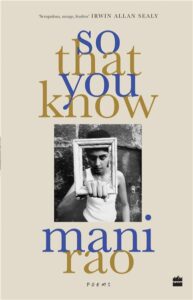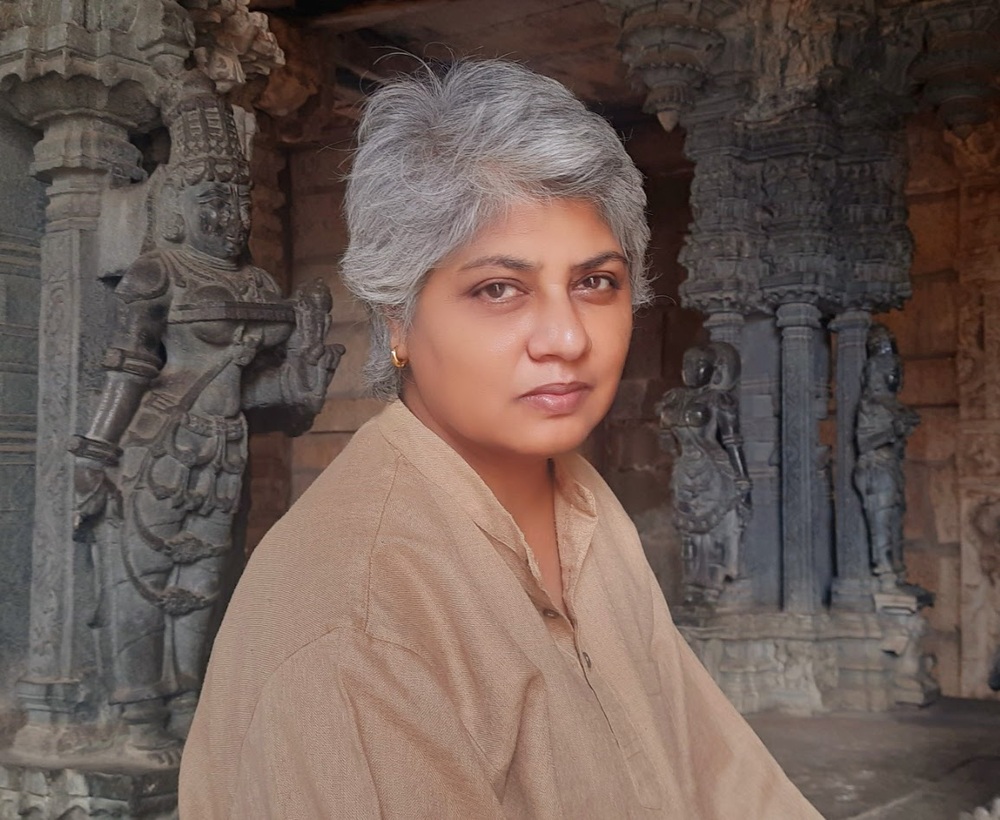Mani Rao, who counts acclaimed translations of Kalidasa and Bhagavad Gita from Sanskrit among her accomplishments, has long been a quiet force in South Asian poetry circles. Her latest extensive collection of original poems, So That You Know, is a work of poise and clarity of thought. The poems engage with diverse themes and resist straightjacketing, yet broadly they explore conversations, relationships, nature, life and death, and mythologies that flow into each other.
In an epigrammatic introduction to one of the book’s several sections, Rao says, “I trust you have met the cast of these poems already. If I do the introductions for some, it won’t be because you are a stranger or lack the skill.”
Writers, fireflies, mistake white paper for light
The only writing really necessary is one’s Last Will and Testament
and even that implies a lack of trust.
Mincing words is an option she explicitly rejects. Each poem instead asserts its individuality while also carrying the quiet confidence of a voice fearless in its expression. The poem “Vers Libre” stands out as a testament of Rao’s originality. It serves as a shining example of freedom that defines her poetry.
When I walked into a poem
and met a meticulous metre
Got battered by drums
that drowned the lyrics
I couldn’t tell the theme
for the scheme and
bum-rush end-rhymes
crashed my dreams
Maybe I ought to mince
my words, toe the line
But I don’t
I am a freedom fighter
Yet the poems do more than describe: they probe, reflect, and question succinctly, directly.
Why can’t a watermelon
Seeds copious like
a lake full of fish,
dead,fins
poking gloss
Be more like a papaya
Beads rounded up
Scrape-easy
Rao draws on knowledge of mythologies from East to West.

Rao draws on her knowledge of mythologies from East to West to construct scenes where familiar themes are retold with a freshness that is both thought-provoking and engaging. The result is a body of work that is rooted in classical sources yet inviting the reader to discover a vision never seen before.
Moon, Sisyphus
Full
Null
Life, Sisyphus
Chain
Who knows how many
Days in the life
of Brahma
“Feted” is another poem where a well-known mythological character is found in an unexpected context:
What does Odysseus do when
the Odyssey is done
Memory’s man
House on fire
The story ate it all
Back from Iraq
Busy being a shape
A guard
And in a departure from Shakespeare’s poem, “Venus and Adonis”, Rao introduces an original and contemporary tone that is both assertive and playful.
Exactly the
accent I like
Olive in mouth
Let’s
in the orchard
pips around us
Promise me you’ll
Speak
Greek
An accompanying footnote throws questions, possibly tinged with a touch of sarcasm: “Venus is sticky and won’t let Adonis go. What makes Greek heroes addictive? Why are Roman Goddesses insufferable?”
In the section “Living Shadows”, the shadow serves as a metaphor for the singular, never-repeating nature of life and existence, rooted, yet unrooted to the body.
My shape holds
shadows like water
No-they’re hung on me
like clothes like air
An endless showing of
disguises, no repeats
The poem “Waiheke Within” has a musical cadence to it while evoking a surreal sense of beauty.
On full-moon nights gliding
from deck to garden
Sucked into an arching tunnel
of tea trees
Speeding over pronounced faces
of orchids
To the fallen pine breathing
mushroom stairwells
For the walk scratched downhill
to the beach.
The poems in this collection span more than a quarter century.
In the innovative poem-essay “I, Lorine Niedecker”, Rao pushes the limits of language and form to explore grief and the absolute power of silence, gathering glimpses of Lorine Niedecker’s life and poetics using only words from the latter’s poetry.
this loud uncovering of griefs
the uses of grief
a pleasure to grieve
I compost with bitterns
I give the soil my phosphorus
Another fine poem essay is “I Talk to Myself — I Talk to You” originally published in the anthology Desde Hong Kong where Octavio Paz is heard in conversation with poets Marquis de Sade, Celan, Dilip Chitre, Faiz, Symborska and PK Leung.
The poems in this collection span more than a quarter century, and in that sense, there is a lifetime of work here. Rao’s poems are to be approached with attentiveness where the act of reading becomes a sacred discovery as words and sentences unlock more than what meets the eye. Her poetry is a living art that demands as much as it offers in return.


You must be logged in to post a comment.